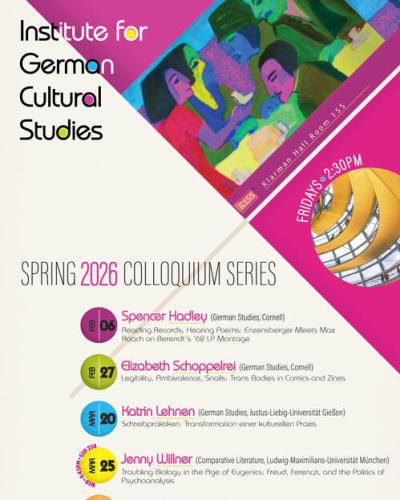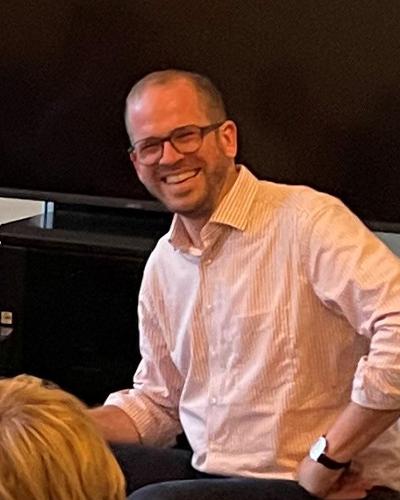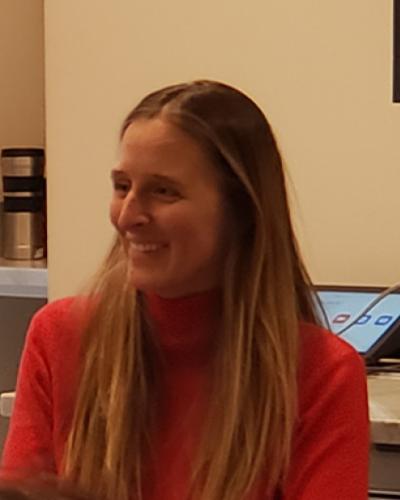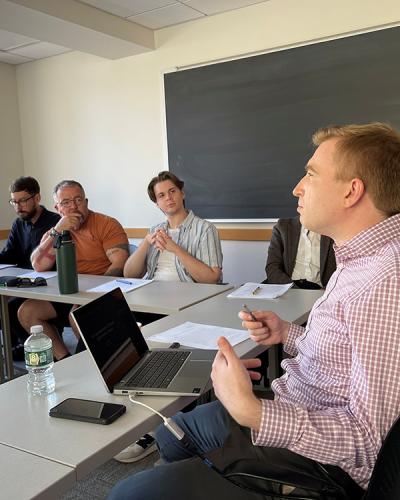On November 2, Professor Damani Partridge, an eminent scholar in Anthropology, Africana Studies, and German Studies at the University of Michigan and Vice President and President Elect of the German Studies Association, gave a lecture on “Blackness as a Universal Claim: Holocaust Heritage, Noncitizen Futures, and Black Power in Berlin” at Cornell. The event was sponsored by the University Lectures Committee; co-sponsoring units included the Society for the Humanities, the Africana Studies & Research Center, the Institute for German Cultural Studies, the Jewish Studies Program, and the Departments of German Studies, Anthropology, and History.
Professor Partridge’s presentation extended arguments and discussions found in his latest, eponymous book, offering profound insights into the multifaceted landscapes of Black identity, citizenship, and activism within the increasingly diverse fabric of contemporary Germany.
Partridge’s book offers a thought-provoking exploration of the complex and dynamic nature of Black identity. In a world marked by racial tensions, inequality, and ongoing struggles for racial justice, Partridge delves into the concept of Blackness as a universal claim, challenging essentialist and monolithic notions of what it means to be Black. His book stands as a significant touchstone within critical race studies, offering a nuanced viewpoint that transcends the traditional boundaries of racial discourse. Partridge's work calls for a re-evaluation of how we understand Black identity, offering a critical examination of its historical, cultural, and political dimensions. His methodological depth contextualizes the conceptual claims of Blackness and places them within the intricate fabric of ethnographic research conducted in Germany. His pioneering work in the interdisciplinary domain of Black German studies grapples with systemic challenges such as "exclusionary integration," which effectively relegates certain individuals to de facto non-citizen status within the German political framework.
Central to Partridge's lecture was the interrogation of Blackness as a tool to articulate desires and challenge existing norms regarding universal claims to freedom. Addressing the struggles faced by African immigrants attempting to assimilate into German society, Partridge highlighted unconventional pathways, such as involvement in theater groups researching Black power, as a means to enact social change amidst societal barriers.
The lecture invited the audience to examine the possibilities and limitations of a universalized Black politics. Partridge meticulously chronicled the experiences of young individuals in Germany—of Turkish, Arab, and African descent—who strategically wield claims of Blackness to hold institutions accountable in their everyday struggle. They often invoke symbols of Black Power, echoing historical moments such as the iconic medal-podium salute from the 1968 Olympics, and aligning themselves symbolically with figures such as Malcolm X and Angela Davis. Professor Partridge probed the demands placed upon young immigrants by educational and governmental institutions. In keeping with the German state's commitment to anti-genocidal education, they are to assume responsibility for countering the global persistence of anti-Semitism. Examining these demands, Partridge illuminated the entangled relationships between the European Enlightenment, Holocaust memory, and Black futurity, and emphasized the resilient efforts of noncitizens striving to reshape their everyday lives.
Partridge’s ethnographic research demonstrates the role of Blackness as a galvanizing force, energizing and inspiring democratic participation beyond national belonging for immigrants, refugees, Black individuals, and People of Color. Showcasing these narratives, he illuminated pathways that transcend traditional conceptions of citizenship and national identity, underlining the transformative potential of Blackness in fostering inclusive and participatory societies.
In his work, Professor Partridge interrogates the historical roots of Black identity and its evolution over time. He examines how the concept of Blackness has been shaped by colonization, slavery, and resistance movements. Exploring the role of culture in defining Blackness, he examines the significant role that art, music, and literature have played in constructing Black identity. Moreover, he addresses significant political implications when asking how Blackness has been used to advocate for social justice and civil rights. Partridge’s cultural perspective not only enriches our understanding of Blackness but also underscores the importance of acknowledging the diversity within the Black experience. His book enriches this perspective in three ways:
- Partridge broadens the historical scope to encompass contemporary Germans, including the experiences of Black Americans in West Germany. This expansion illuminates the dynamic evolution of Black identity over time.
- Partridge examines various ethnographic materials, such as the rehearsal spaces of Blackness created by youth groups advocating for genuine democracy and state-funded activities aimed at promoting Holocaust memory culture. These materials help to elucidate the multifaceted nature of Black identity and its relevance in diverse contexts.
- Through his expansive repertoire, Partridge introduces a new critical concept of Blackness as a universal claim. This concept serves to address racism within German institutions and to analyze how Blackness, when viewed as a universal claim, actively enables minorities to participate in the agential production of democratic futures for all.
A pivotal aspect of Partridge's lecture revolved around the transformative potential of rehearsal spaces as catalysts for societal change. Emphasizing improvisation and intervention, these spaces serve as incubators for the insurrectionary imagination. They challenge static representations of Blackness and foster opportunities for self-reclamation and societal reconfiguration. Partridge provocatively explored the blurred boundaries between high art, culture, and politics, advocating for an inclusive perspective where art becomes a vehicle for political expression.
The discussion following the presentation shed additional light on the depth and complexity of the issues explored in Partridge’s book. The vast range of comments and questions raised by the audience revealed the multifaceted relevance of his work. One of its central themes is the idea that Blackness is not a stable category and should not be reduced to mere phenotypic features. Instead, it is a dynamic and transnational concept that captures experiences of oppression and social positioning. Partridge’s book highlights the relevance of the term "Black" in different cultural and historical contexts, such as the distinct experiences of African immigrants in Germany and the historical significance of Blackness in South Africa. Blackness taken as a universal claim transcends borders and adapts to various geopolitical locations and circumstances.
Audience feedback touched upon the relationship between Blackness and other transnational reference points. Questions arose regarding the influence of thinkers like Audre Lorde and Frantz Fanon, and how their work aligns with or diverges from the concept of Blackness as presented by Partridge. To be sure, his book is a call to resist essentializing Blackness, and a warning of the danger of erasing the specificity of different contexts and experiences. The concept of "rehearsal" is particularly intriguing, as it offers a way to navigate the complexities of Black identity without fixing it into one singular definition.
Further comments emphasized the importance of looking at Blackness beyond its role as an expression of oppression and focusing instead on its potential as a catalyst for social change and political transformation. Partridge's ethnographic research in Germany provides a unique perspective on how Blackness intersects with the country's history, particularly in relation to the Holocaust and issues of anti-Semitism. The book's examination of rehearsal spaces, both in high art theaters and on the streets in the form of activism, underscores the dynamic and evolving nature of Black identity. Other issues raised included the sustainability of the “undoing” and “redoing” processes of Blackness, and how they relate to material conditions, funding structures, and the evolving definitions of Black identity among different populations. Overall, the discussion highlighted the potential of rehearsal as a means of effecting change and examined its impact on broader social and political contexts.
As Professor Partridge’s lecture made clear, his work on Blackness as a Universal Claim invites readers to engage with this complex, evolving concept and to tap its potential as a vehicle for political transformation in a rapidly changing global landscape. It seeks to transform Blackness from a static label into a mobilizing force for social change, embracing the immediacy of transformational needs within society. Damani Partridge’s well-attended University lecture at Cornell heralded a transformative call to re-imagine citizenship, politics, and artistic expression through the nuanced lens of Blackness.





